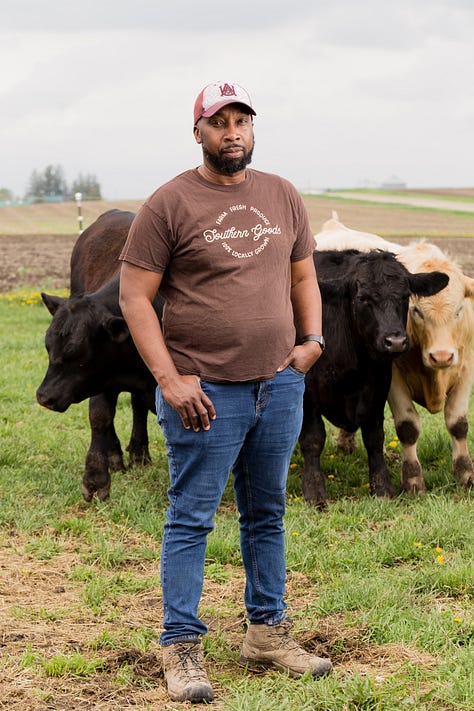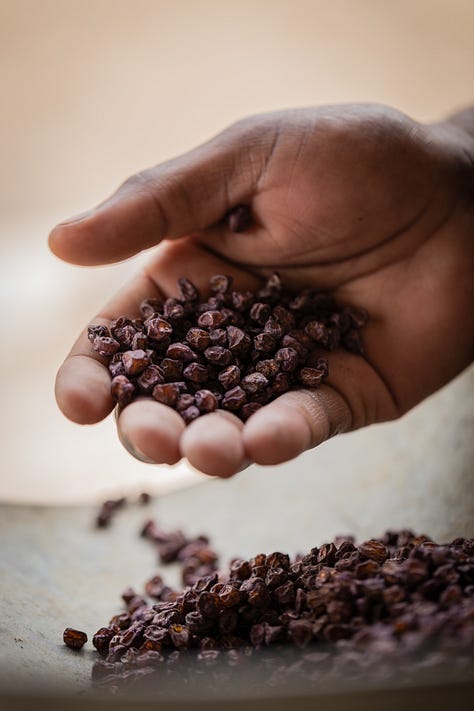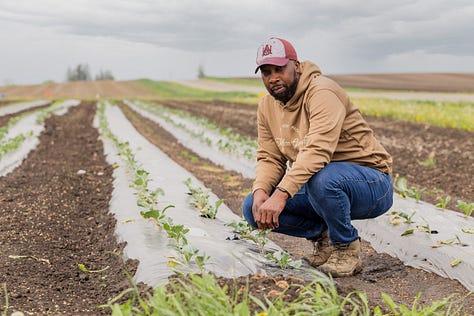LFPA Grows Local Food Markets
Southern Goods farm brings the South to an Iowa food bank
Small and midsize farmers wear many hats in order to run their businesses and generate income while feeding their communities. Farming in Iowa is also an inherently risky and uncertain pursuit due to weather, pests, diseases, and market fluctuations. Identifying and supporting opportunities that can minimize market risk and uncertainties for farmers is essential to keep our Iowa communities thriving. One way the LFPA supports the work of Iowa’s farmers is by offering an additional market so farmers can spend time mitigating all the other risks they manage.
In 2021, the U.S. Department of Agriculture (USDA) established the Local Food Purchasing Assistance (LFPA) program creating another revenue stream for local farmers. This program is led by partners across the state through a cooperative agreement between Iowa Department of Agriculture and Land Stewardship (IDALS) and United States Department of Agriculture (USDA) and managed by Amana based non-profit Iowa Valley RC&D.
With the Iowa LFPA program in place, mutually beneficial partnerships that help address food insecurity and support local agriculture planted seeds in the minds of local farmers. Connecting local farmers with new partners who could purchase and distribute their produce watered those seeds. A fruitful connection grew between Shaffer Ridgeway - owner and operator of Southern Goods LLC in Waterloo, Iowa - and the Northeast Iowa Food Bank (NEIFB).
Since 2019, Southern Goods has provided beef and southern produce like collard greens, turnip greens, okra, purple hull peas, and sweet potatoes to the Waterloo community. Shaffer Ridgeway says, "We like to say we bring the South to the Midwest."



Historically, Black farmers in the United States have faced numerous challenges and obstacles when it comes to farming, including discrimination, limited access to credit and land, and systemic racism. These factors have exacerbated the risks and uncertainties involved in farming for Black farmers, making it even more difficult to maintain sustainable and profitable farming operations. As Shaffer explains,
“The biggest thing if you go to grocery stores or businesses to sell your produce is [that] you have to already be at scale and prove that you can sell so many bundles of greens a week. [Otherwise] they don’t talk to you and have a conversation.”
Initiating conversations with Black farmers in Iowa, who are deeply talented and committed to connecting the community with good food, is long overdue. We Arose Co-op, is one such cooperative organization leading good food initiatives and building power for the next generation of Black Iowan farmers and growers. Executive Director of We Arose, DaQuan Campbell, works with Ridgeway and other steering committee members and farmers in the Waterloo area to find creative solutions. Fortunately, despite challenges, community-led initiatives like We Arose Co-op and programs like the LFPA are sparking more conversations to support and invest in Black farmers.
Becca Huber, NEIFB Food Sourcing Manager, recalls how a single phone call with Shaffer set them on a path to purchasing local produce for the first time through the Iowa LFPA program. The Northeast Iowa Food Bank serves 16 counties starting at the Minnesota border down to Tama County. They have 153 partner agencies that ultimately distribute 5 million meals. Each month their onsite Cedar Valley Food Pantry serves 3,000 people.
Understanding the complexities of working with food banks, Becca shares, "I invited [Shaffer and other producers from We Arose Co-op] to the Northeast Iowa Food Bank to get a better understanding of what [NEIFB's] facility can do." Then, they held an additional meeting to help the NEIFB understand the needs of the community and establish expectations for a successful partnership with goal-oriented timelines. As she puts it, these timelines are "in a way our contract to keep each other accountable [as producer and buyer] for what we expected, but also [establish] the understanding that things can happen.” For example, drought or flooding can affect crop production and change plans set in the winter months.
Reflecting on their partnership so far through the Iowa LFPA program, email exchanges reveal a significant demand for more local produce. Shaffer describes the two-fold impact of their partnership as follows,
“What we are bringing into the food bank is disappearing off the shelf within hours…. It’s a good and a bad thing. We need to put more on the shelf but it’s a good thing that the people want it and are using it.”
As a growing small-scale producer, Shaffer underscores his ability to negotiate prices being integral to his ability to meet the demands of the community. He highlights the Iowa LFPA program’s pricing guidelines noting, "It has allowed us to get a fair price for what we are selling." In anticipation of future growing seasons, he explains, “We cannot scale and pay employees and not get a fair price.”
With the second phase of the Iowa LFPA program, Southern Goods and NEIFB consider ways they can continue to provide fresh and locally grown food in the region they serve. Becca mentions the importance of “preparing and planning prior to planting [as] a key step to continue [their] partnership.” She reiterates how “producers need to know ahead of time what to get and plan for while the food bank needs to continue to monitor what the clients want.”
At the moment the food bank is successfully meeting clients' desires for local produce by sourcing directly from farmers like Shaffer. Thanks to this success the NEIFB looks forward to continued dialogue with their new partners beyond the Iowa LFPA program utilizing their Pick and Pack Out program. For Shaffer, such dialogue offers his business fair and stable market options to continue providing good food to the community and scale further.
To learn more about the program visit the Iowa LFPA website and read the progress report here.






